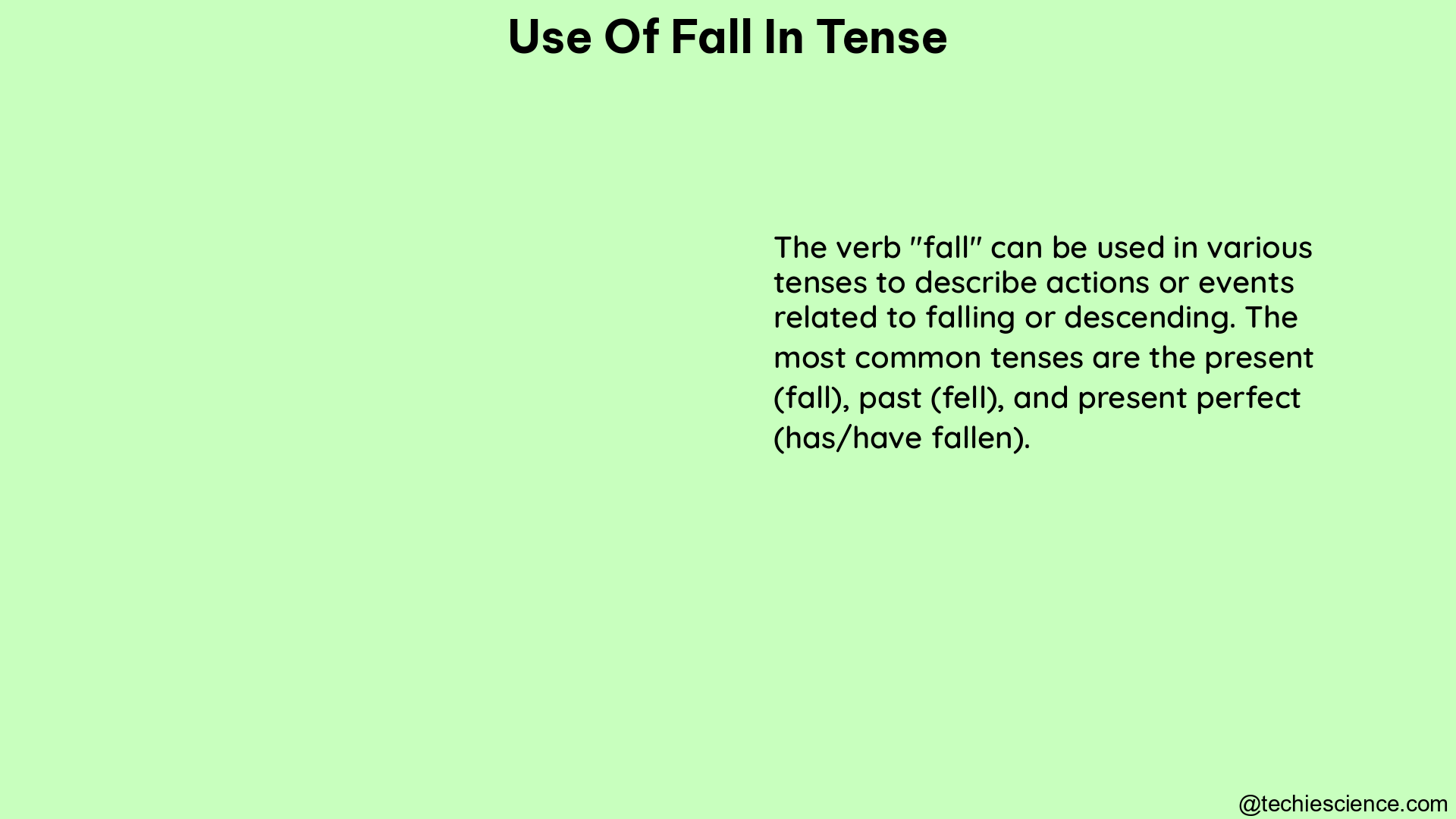The verb “fall” is an irregular verb in the English language, and its usage in different tenses can be quite complex. This comprehensive guide will delve into the intricacies of using “fall” in various tenses, providing you with a thorough understanding of its grammatical applications.
Present Tense
Simple Present
The simple present tense of “fall” is “fall” itself. Here are the conjugations:
- I fall.
- You fall.
- He/She/It falls.
- We fall.
- You fall.
- They fall.
Past Tense

Simple Past
The simple past tense of “fall” is “fell”. Here are the conjugations:
- I fell.
- You fell.
- He/She/It fell.
- We fell.
- You fell.
- They fell.
Past Participle
The past participle of “fall” is “fallen”. This form is used in combination with auxiliary verbs like “has” or “had” to form the present perfect and past perfect tenses.
- I have fallen.
- You have fallen.
- He/She/It has fallen.
- We have fallen.
- You have fallen.
- They have fallen.
Perfect Tenses
Present Perfect
The present perfect tense is formed using “has” or “have” with the past participle “fallen”.
- I have fallen.
- You have fallen.
- He/She/It has fallen.
- We have fallen.
- You have fallen.
- They have fallen.
Past Perfect
The past perfect tense is formed using “had” with the past participle “fallen”.
- I had fallen.
- You had fallen.
- He/She/It had fallen.
- We had fallen.
- You had fallen.
- They had fallen.
Future Perfect
The future perfect tense is formed using “will have” with the past participle “fallen”.
- I will have fallen.
- You will have fallen.
- He/She/It will have fallen.
- We will have fallen.
- You will have fallen.
- They will have fallen.
Progressive Tenses
Present Progressive
The present progressive tense is formed using “am,” “is,” or “are” with the present participle “falling”.
- I am falling.
- You are falling.
- He/She/It is falling.
- We are falling.
- You are falling.
- They are falling.
Past Progressive
The past progressive tense is formed using “was” or “were” with the present participle “falling”.
- I was falling.
- You were falling.
- He/She/It was falling.
- We were falling.
- You were falling.
- They were falling.
Future Progressive
The future progressive tense is formed using “will be” with the present participle “falling”.
- I will be falling.
- You will be falling.
- He/She/It will be falling.
- We will be falling.
- You will be falling.
- They will be falling.
Contextual Usage
Active vs. Passive Voice
The verb “fell” is used in the active voice, while “fallen” is used in the passive voice.
- Active: I fell.
- Passive: I have been fallen.
Current State vs. Past State
The phrase “I have fallen” implies a current state of being fallen, while “I fell” implies a past action of falling.
Examples
Idiomatic Expressions
The verb “fall” is used in various idiomatic expressions, such as “fall in love” or “fall out of favor”.
Contextual Examples
- Apples fall from a tree when there’s a storm (present tense).
- Jim fell off of a ladder and broke his arm (past tense).
Conclusion
The usage of the verb “fall” in English tenses can be complex, but with a thorough understanding of its conjugations and contextual applications, you can master its usage with confidence. This comprehensive guide has provided you with the necessary knowledge to effectively employ “fall” in your written and spoken communication.
References
- https://www.reddit.com/r/CasualConversation/comments/18yr4jt/is_it_fallen_or_fell/
- https://www.learnamericanenglishonline.com/Word%20of%20the%20Day/2015-2/August/fall.html
- https://www.wordreference.com/conj/enverbs.aspx?v=fall
Hey! I am Arpita Bose Roy. My qualifications are M.A. in English with B. Ed. in both general education and special education. I have 2 years of experience as a “language analyst” at IIT Kharagpur and 4 years of experience as an “Academic Content Developer” at IIT Kharagpur. Currently, I am working as an academic writer at Lambdageeks.